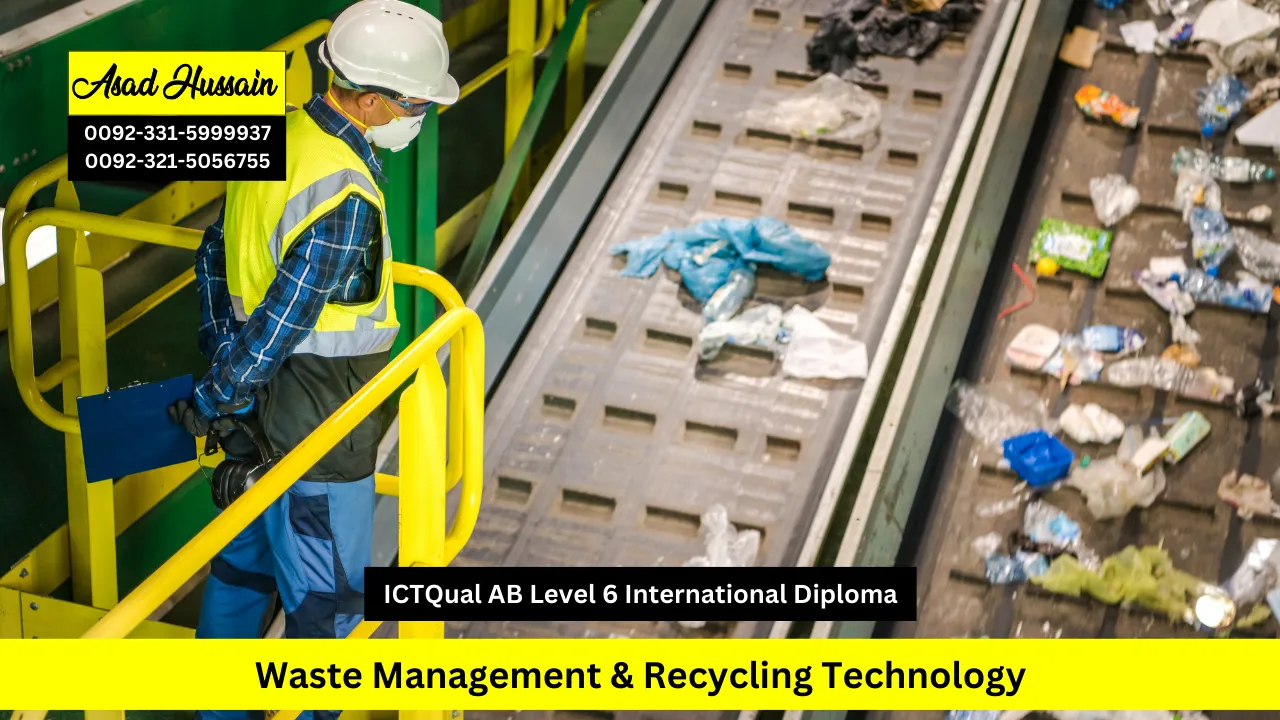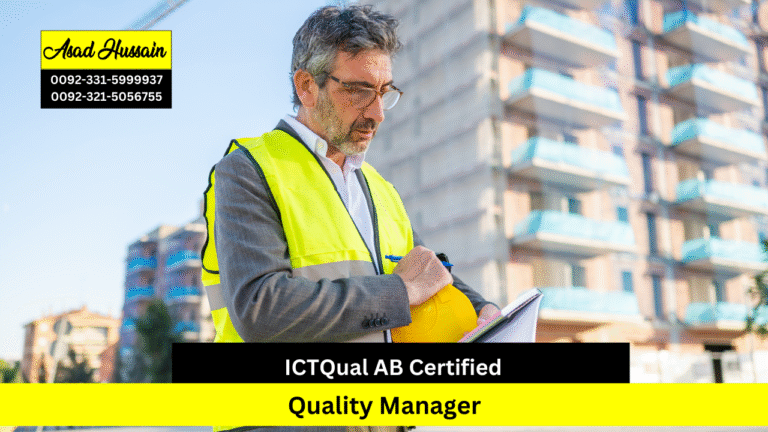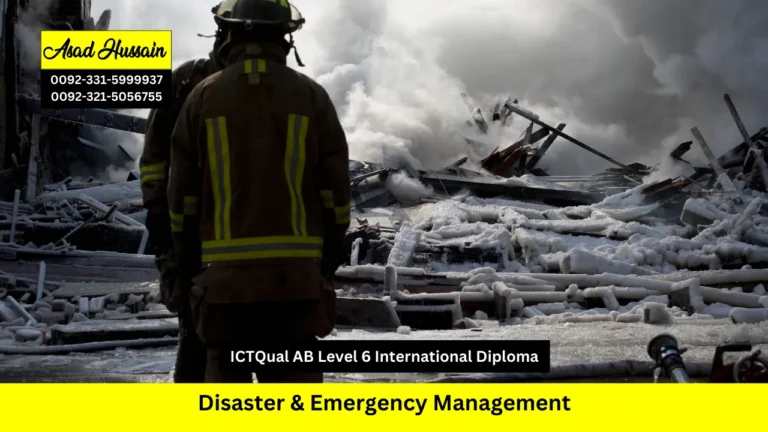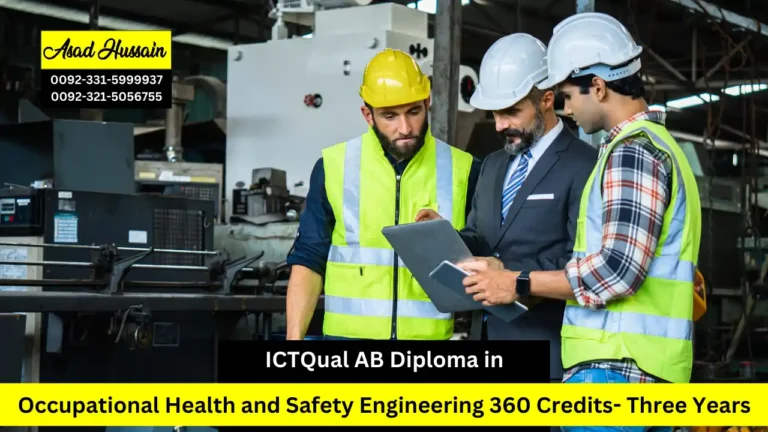Effective waste management and innovative recycling technologies are at the forefront of global sustainability efforts. With industries and governments seeking sustainable solutions to minimize environmental impact, the demand for qualified professionals in waste management and recycling has never been higher. The ICTQual AB Level 6 International Diploma in Waste Management & Recycling Technology equips learners with the advanced knowledge and applied skills required to address one of today’s most pressing challenges—managing waste responsibly while promoting environmental sustainability.
ICTQual ABLevel 6 International Diploma in Waste Management & Recycling Technology provides an in-depth understanding of waste classification, treatment processes, recycling innovations, and sustainable disposal methods. Learners will explore both the scientific and technological aspects of waste management, including waste-to-energy solutions, hazardous waste handling, circular economy principles, and compliance with global environmental standards.
Graduates of ICTQual ABLevel 6 International Diploma in Waste Management & Recycling Technology will be equipped to design, implement, and manage effective waste management strategies across industries, municipalities, and international organizations. They will also gain the skills to advise policymakers, promote recycling initiatives, and apply innovative technologies that support global sustainability goals.
Whether you aim to become a Waste Management Specialist, Recycling Technology Consultant, or Environmental Compliance Officer, this internationally recognized qualification will prepare you to take on leadership roles in a rapidly growing sector dedicated to building a cleaner and more sustainable future.
Program Highlights
Study Units
Year 1 – Foundations of Waste Management & Recycling Technology
- Principles of Waste Management
- Introduction to Environmental Science and Sustainability
- Waste Legislation and Regulatory Compliance
- Waste Hierarchy and Circular Economy Concepts
- Hazardous and Non-Hazardous Waste Management
- Solid Waste Collection and Transportation Systems
- Recycling Technologies and Processes
- Water and Air Quality in Waste Management
- Occupational Health, Safety, and Environmental Awareness
- Environmental Communication and Reporting
- Professional Ethics in Waste Management
- Introduction to Project Planning in Waste Management
Year 2 – Applied Waste Management & Recycling Practices
- Advanced Waste Treatment and Processing Techniques
- Industrial Waste Management
- Hazardous Waste Handling and Disposal
- Waste-to-Energy Technologies
- Resource Recovery and Sustainable Practices
- Environmental Monitoring and Audit Techniques
- Waste Management in Manufacturing and Commercial Sectors
- Digital Tools and Technologies in Waste Management
- Environmental Risk Assessment and Management
- Behavioural and Organisational Approaches to Waste Safety
- Research Methods for Waste and Recycling Projects
- Project Implementation and Operational Planning
Year 3 – Strategic Leadership in Waste Management & Recycling
- Strategic Waste Management and Governance
- Integrated Environmental Management Systems (ISO 14001, ISO 50001)
- Policy Development and Implementation in Waste Management
- Sustainability Leadership and Corporate Social Responsibility (CSR)
- Environmental Risk Management in Large-Scale Projects
- Renewable Energy Integration in Waste Management
- International Waste Management Standards and Best Practices
- Innovation and Emerging Technologies in Recycling
- Environmental Crisis Management and Emergency Planning
- Advanced Occupational Health & Environmental Wellbeing Strategies
- Independent Research Project in Waste Management & Recycling
- Capstone Project: Applied Waste Management & Recycling Technology
To uphold the academic rigor and professional integrity of the program, applicants are required to meet clearly defined entry requirements. These criteria are designed to ensure that every learner enrolling in the ICTQual AB Level 6 International Diploma in Waste Management & Recycling Technology possesses the foundational knowledge, relevant experience, and language proficiency necessary to succeed in this advanced qualification.
Age Requirements
- Applicants must be at least 18 years old at the time of enrollment of ICTQual ABLevel 6 International Diploma in Waste Management & Recycling Technology.
- Mature learners above the age of 21 with relevant experience may also apply.
Educational Requirements
- A recognized Level 5 qualification (or equivalent) in environmental studies, engineering, or a related discipline is preferred.
- Candidates with alternative qualifications but a strong interest in waste management and recycling will be considered.
Professional Experience
- Applicants with at least two years of relevant work experience in waste management, recycling, environmental compliance, or sustainability are encouraged to apply.
- Industry professionals looking to upskill or transition into specialized waste management roles are highly suitable for this diploma.
English Language Proficiency
- Non-native English speakers must demonstrate English language proficiency, either through recognized testing (e.g., IELTS, TOEFL) or equivalent qualifications.
- Applicants with previous education or work experience in English may be exempt from testing requirements.
By carefully setting these entry requirements, the ICTQual AB Level 6 International Diploma in Waste Management & Recycling Technology ensures that only motivated and capable learners join the program. These standards not only guarantee that participants are adequately prepared but also help maintain the program’s reputation as a globally recognized and professionally respected qualification.
The ICTQual AB Level 6 International Diploma in Waste Management & Recycling Technology provides learners with comprehensive knowledge, practical skills, and strategic competencies to manage waste efficiently, implement recycling initiatives, and lead sustainability programs. ICTQual AB Level 6 International Diploma in Waste Management & Recycling Technology combines theoretical foundations with hands-on applications to prepare graduates for professional roles in waste management, environmental consulting, and sustainable development sectors.
Year 1 – Foundations of Waste Management & Recycling Technology
Principles of Waste Management
- Understand the core principles and objectives of waste management.
- Apply waste management strategies to minimize environmental impact.
- Evaluate waste streams using measurable standards.
Introduction to Environmental Science and Sustainability
- Explain environmental systems and sustainability concepts.
- Apply sustainability principles to waste management practices.
- Assess environmental performance of operations using quantitative metrics.
Waste Legislation and Regulatory Compliance
- Identify national and international waste management laws and regulations.
- Apply regulatory requirements to operational practices.
- Evaluate compliance effectiveness using measurable indicators.
Waste Hierarchy and Circular Economy Concepts
- Understand the waste hierarchy (reduce, reuse, recycle, recover, dispose).
- Apply circular economy principles to optimize resource efficiency.
- Assess outcomes of circular practices using measurable standards.
Hazardous and Non-Hazardous Waste Management
- Differentiate between hazardous and non-hazardous waste streams.
- Apply appropriate handling, storage, and disposal methods.
- Evaluate safety and compliance measures using measurable indicators.
Solid Waste Collection and Transportation Systems
- Plan and implement effective waste collection systems.
- Apply transportation strategies to ensure efficiency and safety.
- Evaluate operational performance against standards.
Recycling Technologies and Processes
- Understand mechanical, chemical, and biological recycling processes.
- Apply recycling techniques to different waste streams.
- Assess the efficiency and environmental impact of recycling operations.
Water and Air Quality in Waste Management
- Monitor and analyze water and air quality in waste management contexts.
- Apply mitigation strategies to minimize pollution.
- Evaluate environmental performance using measurable standards.
Occupational Health, Safety, and Environmental Awareness
- Identify health and safety risks in waste management operations.
- Apply safety protocols to prevent accidents and environmental hazards.
- Assess safety measures using measurable criteria.
Environmental Communication and Reporting
- Develop strategies for effective environmental communication.
- Apply reporting standards for waste and sustainability initiatives.
- Evaluate communication effectiveness and stakeholder engagement.
Professional Ethics in Waste Management
- Apply ethical principles in decision-making and operational management.
- Ensure accountability in waste handling and sustainability initiatives.
- Assess compliance with professional and ethical standards.
Introduction to Project Planning in Waste Management
- Plan projects related to waste management and recycling initiatives.
- Apply project management principles to ensure timely and effective execution.
- Evaluate project outcomes using measurable metrics.
Year 2 – Applied Waste Management & Recycling Practices
Advanced Waste Treatment and Processing Techniques
- Apply advanced techniques for processing and treating waste.
- Evaluate treatment efficiency using measurable environmental standards.
- Implement practical solutions to optimize waste operations.
Industrial Waste Management
- Manage waste generated in industrial settings efficiently.
- Apply treatment, recycling, and disposal techniques suitable for industrial operations.
- Evaluate environmental compliance and operational performance.
Hazardous Waste Handling and Disposal
- Implement safe handling, storage, and disposal of hazardous waste.
- Apply regulatory standards and risk mitigation strategies.
- Evaluate safety and environmental compliance using measurable metrics.
Waste-to-Energy Technologies
- Understand technologies converting waste into energy (biogas, incineration, etc.).
- Apply operational techniques to optimize energy recovery.
- Assess efficiency, environmental impact, and sustainability outcomes.
Resource Recovery and Sustainable Practices
- Implement strategies for resource recovery from waste streams.
- Apply circular economy practices to minimize environmental footprint.
- Evaluate sustainability performance using measurable standards.
Environmental Monitoring and Audit Techniques
- Conduct audits to monitor environmental compliance and performance.
- Apply monitoring tools and techniques in waste operations.
- Evaluate audit outcomes and implement improvements.
Waste Management in Manufacturing and Commercial Sectors
- Apply waste management strategies in manufacturing and commercial operations.
- Optimize collection, treatment, and recycling processes.
- Evaluate operational performance using measurable indicators.
Digital Tools and Technologies in Waste Management
- Utilize digital tools for monitoring, reporting, and optimizing waste operations.
- Apply technology for data-driven decision-making.
- Assess effectiveness of digital solutions in improving efficiency.
Environmental Risk Assessment and Management
- Identify potential environmental risks in waste management operations.
- Apply risk assessment and mitigation techniques.
- Evaluate risk management effectiveness using measurable standards.
Behavioural and Organisational Approaches to Waste Safety
- Implement organizational strategies to enhance safety culture.
- Apply behavioral techniques to promote environmental responsibility.
- Assess compliance and behavioral outcomes using measurable metrics.
Research Methods for Waste and Recycling Projects
- Conduct applied research to support waste management strategies.
- Apply quantitative and qualitative research methods to real-world problems.
- Present research findings using professional and measurable standards.
Project Implementation and Operational Planning
- Plan and execute applied projects in waste management and recycling.
- Apply operational management techniques to ensure efficiency and sustainability.
- Evaluate project outcomes against measurable objectives and standards.
Year 3 – Strategic Leadership in Waste Management & Recycling
Strategic Waste Management and Governance
- Develop strategic waste management plans for organizations or communities.
- Apply governance frameworks to ensure compliance and efficiency.
- Evaluate strategic outcomes using measurable performance indicators.
Integrated Environmental Management Systems (ISO 14001, ISO 50001)
- Implement integrated environmental and energy management systems.
- Apply ISO standards to operational and strategic processes.
- Assess compliance and effectiveness of management systems.
Policy Development and Implementation in Waste Management
- Develop policies for sustainable waste management practices.
- Apply policies to operational and strategic decision-making.
- Evaluate policy outcomes using measurable metrics.
Sustainability Leadership and Corporate Social Responsibility (CSR)
- Lead sustainability initiatives and CSR projects effectively.
- Apply strategic thinking to promote environmental responsibility.
- Assess leadership impact on organizational sustainability performance.
Environmental Risk Management in Large-Scale Projects
- Identify, assess, and mitigate environmental risks in large-scale operations.
- Apply risk management strategies to ensure safety and compliance.
- Evaluate effectiveness using measurable standards.
Renewable Energy Integration in Waste Management
- Apply renewable energy solutions in waste treatment and recycling processes.
- Optimize integration of sustainable energy in operations.
- Assess environmental and operational benefits using measurable criteria.
International Waste Management Standards and Best Practices
- Apply international standards and guidelines in waste management operations.
- Benchmark organizational practices against global best practices.
- Evaluate compliance and performance using measurable metrics.
Innovation and Emerging Technologies in Recycling
- Identify and implement innovative recycling technologies.
- Apply emerging tools to optimize resource recovery and sustainability.
- Evaluate operational impact and environmental outcomes.
Environmental Crisis Management and Emergency Planning
- Develop strategies for managing environmental crises and emergencies.
- Apply planning and response techniques in real-world scenarios.
- Assess crisis management effectiveness using measurable indicators.
Advanced Occupational Health & Environmental Wellbeing Strategies
- Implement advanced health, safety, and environmental wellbeing programs.
- Apply strategies to ensure workforce safety and environmental protection.
- Evaluate program outcomes using measurable standards.
Independent Research Project in Waste Management & Recycling
- Conduct independent research on a relevant topic in waste management.
- Apply analytical and problem-solving skills to investigate practical issues.
- Present research findings professionally using measurable standards.
Capstone Project: Applied Waste Management & Recycling Technology
- Integrate knowledge and skills from all units into a comprehensive applied project.
- Apply strategic, operational, and leadership competencies to solve real-world waste challenges.
- Evaluate project success using measurable performance and environmental impact indicators.
Upon completion of ICTQual AB Level 6 International Diploma in Waste Management & Recycling Technology, learners will possess advanced knowledge, practical skills, and leadership competencies to manage waste, implement recycling solutions, and drive sustainable practices across industries and communities globally.
The ICTQual AB Level 6 International Diploma in Waste Management & Recycling Technology is designed for individuals committed to driving innovation, sustainability, and compliance in the field of waste management. ICTQual ABLevel 6 International Diploma in Waste Management & Recycling Technology is suitable for a wide range of learners, from educators and advocates to policymakers and career changers, who are passionate about building solutions for a cleaner, more sustainable world.
Educational Instructors and Trainers
- Instructors teaching environmental science or engineering can expand their expertise by integrating advanced waste management and recycling technologies into their courses.
- Trainers will gain updated knowledge to design impactful learning programs that meet current global standards in waste management.
Environmental Advocates and Activists
- Activists promoting sustainability initiatives will benefit from in-depth knowledge of recycling processes, waste hierarchy, and circular economy principles.
- Learners will acquire the ability to design and implement practical community-based waste reduction and awareness campaigns.
Students and Recent Graduates
- Graduates of environmental science, engineering, or related fields will strengthen their career prospects by gaining applied skills in waste and recycling management.
- This diploma provides a competitive edge for entry-level roles in sustainability, waste treatment, and environmental compliance sectors.
Career Changers
- Professionals seeking to transition into the growing field of waste management and recycling can build solid expertise in compliance, project planning, and advanced recycling technologies.
- The course equips learners with the confidence to adapt prior skills while embracing new opportunities in sustainability and environmental leadership.
Policy Makers and Regulators
- Policymakers will gain critical insights into waste legislation, regulatory compliance, and global sustainability frameworks.
- Learners will be empowered to design and enforce effective waste policies that align with international best practices and protect communities and ecosystems.
Whether you are an instructor shaping future professionals, an activist driving sustainability campaigns, a graduate entering the workforce, a career changer pursuing new opportunities, or a policymaker influencing global environmental standards, the ICTQual AB Level 6 International Diploma in Waste Management & Recycling Technology provides the skills, knowledge, and recognition needed to excel in this vital sector.







